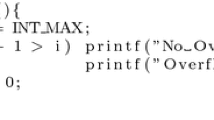Abstract
Proof-Carrying Code (PCC) allows a code producer to provide to a host a program along with its formal safety proof. The proof attests a certain safety policy enforced by the code, and can be mechanically checked by the host. While this language-based approach to code certification is very general in principle, existing PCC systems have only focused on programs whose safety proofs can be automatically generated. As a result, many low-level system libraries (e.g., memory management) have not yet been handled. In this paper, we explore a complementary approach in which general properties and program correctness are semiautomatically certified. In particular, we introduce a low-level language CAP for building certified programs and present a certified library for dynamic storage allocation.
This research is based on work supported in part by DARPA OASIS grant F30602-99- 1-0519, NSF grant CCR-9901011, and NSF ITR grant CCR-0081590. Any opinions, findings, and conclusions contained in this document are those of the authors and do not reflect the views of these agencies.
Chapter PDF
Similar content being viewed by others
Keywords
These keywords were added by machine and not by the authors. This process is experimental and the keywords may be updated as the learning algorithm improves.
References
A. W. Appel. Foundational proof-carrying code. In Proc. 16th Annual IEEE Symposium on Logic in Computer Science, pages 247–258, June 2001.
C. Colby, P. Lee, G. Necula, F. Blau, M. Plesko, and K. Cline. A certifying compiler for Java. In Proc. 2000 ACM Conf. on Prog. Lang. Design and Impl., pages 95–107, New York, 2000. ACM Press.
T. Coquand and G. Huet. The calculus of constructions. Information and Computation, 76:95–120, 1988.
J.-C. Filliâtre. Verification of non-functional programs using interpretations in type theory. Journal of Functional Programming (to appear), 2001.
J.-C. Filliâtre. The WHY certification tool, tutorial and reference manual. http://why.lri.fr/, July 2002.
C. A. R. Hoare. An axiomatic basis for computer programming. Communications of the ACM, Oct. 1969.
C. A. R. Hoare. Proof of a program: FIND. Communications of the ACM, Jan. 1971.
W. A. Howard. The formulae-as-types notion of constructions. In To H.B.Curry: Essays on Computational Logic, Lambda Calculus and Formalism. Academic Press, 1980.
B. W. Kernighan and D. M. Ritchie. The C Programming Language (Second Edition). Prentice Hall, 1988.
D. E. Knuth. The Art of Computer Programming (Second Edition), volume 1. Addison-Wesley, 1973.
G. Morrisett, D. Walker, K. Crary, and N. Glew. From System F to typed assembly language. In Proc. 25th ACM Symp. on Principles of Prog. Lang., pages 85–97. ACM Press, Jan. 1998.
G. Necula. Proof-carrying code. In Proc. 24th ACM Symp. on Principles of Prog. Lang., pages 106–119, New York, Jan. 1997. ACM Press.
G. Necula and P. Lee. Safe kernel extensions without run-time checking. In Proc. 2nd USENIX Symp. on Operating System Design and Impl., pages 229–243, 1996.
G. Necula and P. Lee. The design and implementation of a certifying compiler. In Proc. 1998 ACM Conf. on Prog. Lang. Design and Impl., pages 333–344, New York, 1998.
C. Paulin-Mohring. Inductive definitions in the system Coq-rules and properties. In M. Bezem and J. Groote, editors, Proc. TLCA, volume 664 of LNCS. Springer-Verlag, 1993.
J. C. Reynolds. Lectures on reasoning about shared mutable data structure. IFIP Working Group 2.3 School/Seminar on State-of-the-Art Program Design Using Logic, Tandil, Argentina, September 6-13, 2000.
J. C. Reynolds. Separation logic: A logic for shared mutable data structures. In Proceedings Seventeenth Annual IEEE Symposium on Logic in Computer Science, Los Alamitos, California, 2002. IEEE Computer Society.
The Coq Development Team. The Coq proof assistant reference manual. The Coq release v7.1, Oct. 2001.
The FLINT Project. Coq implementation for certified dynamic storage allocation. http://flint.cs.yale.edu/flint/publications/cdsa.html, Oct. 2002.
P. R. Wilson, M. S. Johnstone, M. Neely, and D. Boles. Dynamic storage allocation: A survey and critical review. In Proc. Int. Workshop on Memory Management, Kinross Scotland (UK), 1995.
A. K. Wright and M. Felleisen. A syntactic approach to type soundness. Information and Computation, 115(1):38–94, 1994.
D. Yu, N. A. Hamid, and Z. Shao. Building certified libraries for PCC: Dynamic storage allocation. Technical Report YALEU/DCS/TR-1247, Dept. of Computer Science, Yale Univeristy, New Haven, CT, Jan. 2003. http://flint.cs.yale.edu/.
Author information
Authors and Affiliations
Editor information
Editors and Affiliations
Rights and permissions
Copyright information
© 2003 Springer-Verlag Berlin Heidelberg
About this paper
Cite this paper
Yu, D., Hamid, N.A., Shao, Z. (2003). Building Certified Libraries for PCC: Dynamic Storage Allocation. In: Degano, P. (eds) Programming Languages and Systems. ESOP 2003. Lecture Notes in Computer Science, vol 2618. Springer, Berlin, Heidelberg. https://doi.org/10.1007/3-540-36575-3_25
Download citation
DOI: https://doi.org/10.1007/3-540-36575-3_25
Published:
Publisher Name: Springer, Berlin, Heidelberg
Print ISBN: 978-3-540-00886-6
Online ISBN: 978-3-540-36575-4
eBook Packages: Springer Book Archive




